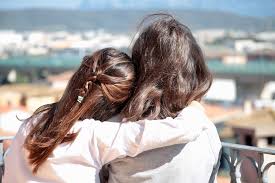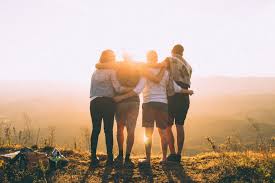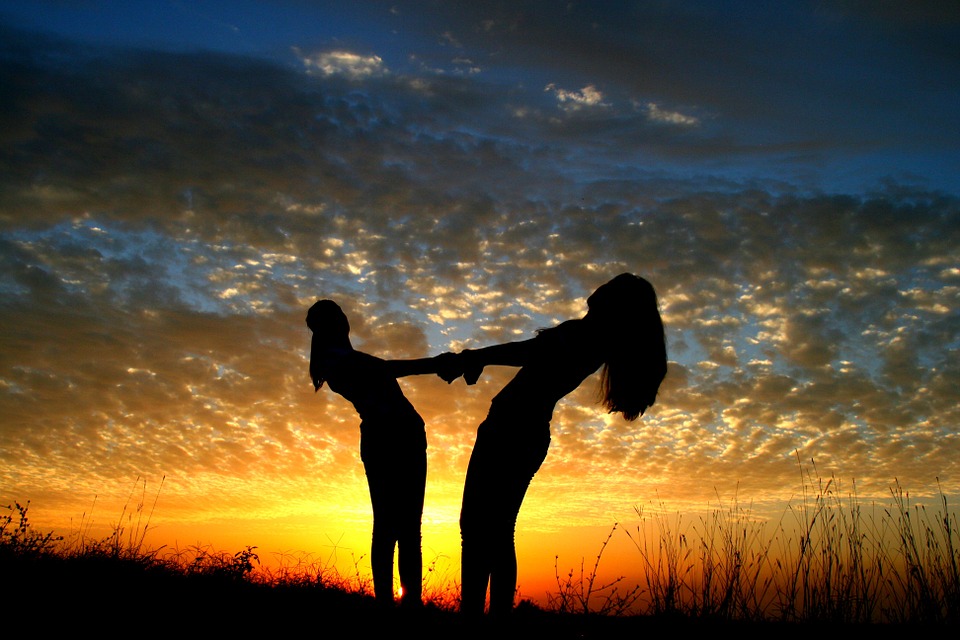14 February 2019
Measuring Happiness
The importance of friends.
By Lynda Goetz
 There is plenty in the news currently, from the no-progress Brexit to the stalemate in Venezuela via the dying days of the Caliphate, so it may seem somewhat frivolous to be discussing happiness at this time. However, this is, interestingly, an underlying theme in several of the issues in the spotlight, and as today is Valentine’s Day, it seems a not inappropriate time to take a brief look at the issue of happiness and friends.
There is plenty in the news currently, from the no-progress Brexit to the stalemate in Venezuela via the dying days of the Caliphate, so it may seem somewhat frivolous to be discussing happiness at this time. However, this is, interestingly, an underlying theme in several of the issues in the spotlight, and as today is Valentine’s Day, it seems a not inappropriate time to take a brief look at the issue of happiness and friends.
The Jo Cox Loneliness Commission was set up before the death of the late MP and resulted in the appointment last January of the first minister for loneliness, Tracey Crouch. Tracey has since stepped down from her position as Minister for Sport, Civil Society and Loneliness (over the government’s delay in reducing the cap on fixed odds betting) and was replaced in November last year by Mims Davies, less than a month after Theresa May had announced the Government’s Loneliness Strategy. Only last weekend Mims Davies was interviewed in the Yorkshire Post about her own experiences of isolation and how she plans to tackle “one of the biggest challengers that our country has”. Part of the answer, in her view, is technology and the possibility of using apps to connect not just in the virtual world, but in person with people in a similar position who are ‘just around the corner’.
Technology is, at the same time, viewed as part of the problem. A study last autumn, conducted by Radio 4’s All in the Mind in collaboration with The Wellcome Foundation, appeared to show that more young people than the elderly felt lonely and that those who reported feeling loneliest tended to have more ‘online only’ friends. However, since the survey was conducted online, even the researchers felt constrained to point out that ‘as the sample of participants was self-selecting, those who feel lonelier might have been more keen to take part’. Not only that, but it appears highly likely that younger people who feel lonely are more likely to be passing the time answering online surveys than those elderly people who perhaps have physical disabilities such as failing eyesight and whose interaction with technology is probably far less.
Even more recently, most of the dailies on Wednesday reported the findings of a Resolution Foundation Study which showed that people in Britain were most likely to be at their happiest at either 16 or 70 and that subjective well-being when cross-referenced with age reveals a stark U-curve with happiness declining between 16 and 50 (apart from a brief partial recovery in the early twenties).
 Friendships are recognised as playing an important part in our mental well-being and happiness, and Woman’s Hour on Radio 4 dedicated much of Wednesday’s programme to the idea of female friendships. It seems that there is a current tendency to idealise these, not to mention commercialise them with the importing of the American idea of ‘Galantine’s Day’ – apparently the day before Valentine’s Day and the time for celebrating female friendships. (If you had never heard of it, neither had I, nor apparently had the presenters of Woman’s Hour until recently). The discussion on female friendship on the programme embraced a number of aspects, including friendships at work; plays featuring female friendships (All about Eve at the Noel Coward Theatre; Soft Animals at the Soho Theatre; Boots at The Bunker and Dressed at The Battersea Arts Theatre); friendships across age ranges and class differences as well as the effect on friendships of having babies (not always good if others haven’t).
Friendships are recognised as playing an important part in our mental well-being and happiness, and Woman’s Hour on Radio 4 dedicated much of Wednesday’s programme to the idea of female friendships. It seems that there is a current tendency to idealise these, not to mention commercialise them with the importing of the American idea of ‘Galantine’s Day’ – apparently the day before Valentine’s Day and the time for celebrating female friendships. (If you had never heard of it, neither had I, nor apparently had the presenters of Woman’s Hour until recently). The discussion on female friendship on the programme embraced a number of aspects, including friendships at work; plays featuring female friendships (All about Eve at the Noel Coward Theatre; Soft Animals at the Soho Theatre; Boots at The Bunker and Dressed at The Battersea Arts Theatre); friendships across age ranges and class differences as well as the effect on friendships of having babies (not always good if others haven’t).
The words ‘intuition’, ‘emotions’ and ‘magical’ applied to female friendships do seem to put these into some sort of slightly mystical arena, so it will be interesting to hear if any men respond to the invitation from Woman’ Hour to contribute their views on male friendships or even female/male friendships. Is it my imagination but do the younger generation of women really think that somehow they are reinventing what friendship has meant to humans throughout history? Of course the current focus on LGBTQ issues has highlighted the plethora of ways in which we can all relate to one another, but is it really the case that this is an entirely modern phenomenon? If loneliness is, as Mim Davies says, ‘one of the biggest challenges of our time’, then perhaps as modern humans we are actually lacking in certain aspects of life which in earlier times were easier?
Male/female so-called platonic friendships would almost certainly not come into this category, as the imbalance of power in most societies would have largely made these almost impossible (and in some societies still does). Cross-generational friendships might well have been easier, however, as there was less of a tendency to divide societies by age. Older women would have naturally spent time with younger women and passed on the benefit of their experience; similarly with men. Less likely, certainly in this country, would have been cross-class friendships, given the far more rigid hierarchies at play. Whatever the nature of friendships, however, there is no doubt that they play a pivotal role in helping us not merely to cope with life but to enjoy it too. Whether our friends are garnered from those we spent time with at school (and who therefore knew us in our formative years), or those we spent crucial time with at university or in our first jobs, or people we met through our interests or in some cases simply because they were there in the right place at the right time, they are crucial to our well-being.
 It is interesting that as one gets older many friendships made decades earlier can be rekindled in an almost unexpected way. People you worked with, or friends with whom you were at school or shared those early baby years, can reappear in your life and, in spite of massive holes in your actual knowledge of each other’s lives in the interim years (knowledge via annual ‘round robins’ or Facebook doesn’t count), it can be really easy to take up exactly where you left off. With others this may not happen and the friendship has to be simply filed in the ‘past’ category. This does not make it less valuable. It may have been important at the time. If, as the Resolution Foundation study referred to earlier concludes, good health, a partner and a job are important to happiness (as well as owning a home and having a degree, apparently), these are to some extent at least factors which the Office for National Statistics (ONS) can measure. How many friends we need to make us happy is possibly open to question, but most of us do not need the numbers of ‘close’ friends claimed by celebrities. The Duchess of Sussex may have called on just five of her close friends to put her case to People magazine in the US, but Marie Hartwell-Walker on PsychCentral states ‘On average, people have three to five close, personal relationships. That’s all. Those of you who worry that you only have a few close friends can relax. You are well within normal’. Celebrate the friends you have, whether they are male, female or other, younger or older, and if you don’t have enough then remember, as Ms Hartwell-Walker says ‘…other people need friends too. The trick is finding each other… The key to getting connected is getting active’. Happy Valentine’s Day!
It is interesting that as one gets older many friendships made decades earlier can be rekindled in an almost unexpected way. People you worked with, or friends with whom you were at school or shared those early baby years, can reappear in your life and, in spite of massive holes in your actual knowledge of each other’s lives in the interim years (knowledge via annual ‘round robins’ or Facebook doesn’t count), it can be really easy to take up exactly where you left off. With others this may not happen and the friendship has to be simply filed in the ‘past’ category. This does not make it less valuable. It may have been important at the time. If, as the Resolution Foundation study referred to earlier concludes, good health, a partner and a job are important to happiness (as well as owning a home and having a degree, apparently), these are to some extent at least factors which the Office for National Statistics (ONS) can measure. How many friends we need to make us happy is possibly open to question, but most of us do not need the numbers of ‘close’ friends claimed by celebrities. The Duchess of Sussex may have called on just five of her close friends to put her case to People magazine in the US, but Marie Hartwell-Walker on PsychCentral states ‘On average, people have three to five close, personal relationships. That’s all. Those of you who worry that you only have a few close friends can relax. You are well within normal’. Celebrate the friends you have, whether they are male, female or other, younger or older, and if you don’t have enough then remember, as Ms Hartwell-Walker says ‘…other people need friends too. The trick is finding each other… The key to getting connected is getting active’. Happy Valentine’s Day!


